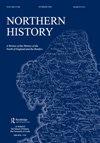Wool Smuggling and the Royal Government in Mid-Fourteenth Century Northumberland
IF 0.2
3区 历史学
Q2 HISTORY
引用次数: 0
Abstract
The international wool trade was an important part of Northumberland’s economy in the fourteenth century, and participation in it was central to the working lives of many local merchants. However, in the mid-fourteenth century the wool trade was subjected to an unprecedented period of royal regulation and taxation. The reaction of local export merchants to this was smuggling. This article examines both the practice and the prosecution of wool smuggling from Northumberland, primarily by use of legal records, and sets smuggling in a wider commercial, constitutional and judicial context to reveal its wider regional significance. Firstly, it situates Northumberland as a region in which this illicit economy assumed a particularly substantial measure of importance in commercial life. Secondly, it engages with the question of governance. Here, by focusing on the perceived legitimacy of taxation and law enforcement in the North-east, it argues that the conflict which resulted from the crown’s attempt to reshape the wool trade led to the blunting of the institutional mechanisms which were supposed to police the export trade in Northumberland. Smuggling therefore reveals some of the limits of royal authority in the far north of England.14世纪中期诺森伯兰郡的羊毛走私与皇家政府
国际羊毛贸易是14世纪诺森伯兰郡经济的重要组成部分,参与其中是许多当地商人工作生活的核心。然而,在14世纪中期,羊毛贸易受到了前所未有的皇家管制和税收。当地出口商人对此的反应是走私。本文主要通过使用法律记录来研究诺森伯兰郡羊毛走私的实践和起诉,并将走私置于更广泛的商业,宪法和司法背景下,以揭示其更广泛的区域意义。首先,它将诺森伯兰郡定位为一个非法经济在商业生活中占有重要地位的地区。其次,它涉及到治理问题。这里,通过关注东北税收和执法的合法性,它认为,国王试图重塑羊毛贸易所导致的冲突导致了诺森伯兰郡监管出口贸易的制度机制的钝化。因此,走私暴露了英格兰远北地区王权的一些局限性。
本文章由计算机程序翻译,如有差异,请以英文原文为准。
求助全文
约1分钟内获得全文
求助全文
来源期刊

Northern History
Multiple-
CiteScore
0.20
自引率
33.30%
发文量
37
期刊介绍:
Northern History was the first regional historical journal. Produced since 1966 under the auspices of the School of History, University of Leeds, its purpose is to publish scholarly work on the history of the seven historic Northern counties of England: Cheshire, Cumberland, Durham, Lancashire, Northumberland, Westmorland and Yorkshire. Since it was launched it has always been a refereed journal, attracting articles on Northern subjects from historians in many parts of the world.
 求助内容:
求助内容: 应助结果提醒方式:
应助结果提醒方式:


